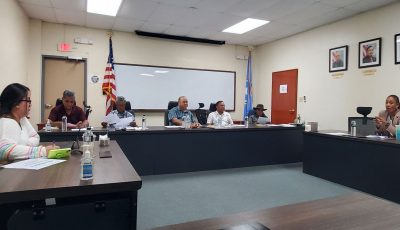7 suing IPI insist $30K-plus attorneys’ fees, costs reasonable
The seven persons who are suing Imperial Pacific International (CNMI) LLC and its contractor and subcontractor over accidents at the worksite of IPI’s casino-resort project in Garapan are insisting that their over $30,000 costs and attorneys’ fees are reasonable and well supported.
The seven plaintiffs, through Saipan lawyer Bruce Berline and New York City-based attorney Aaron Halegua, asked the U.S. District Court for the NMI to grant their motion for attorneys’ fees and court costs and deny IPI’s alleged attempts to re-litigate settled issues and its “baseless objections” to the motion.
The seven workers are now back in China.
Berline and Halegua said despite the U.S. Supreme Court’s instruction that a “request for attorney’s fees should not result in a second major litigation,” IPI has objected to nearly every aspect of the plaintiffs’ motion for attorneys’ fees—“albeit without much legal supports” for its positions or persuasive force.
The seven workers, through their two lawyers, have requested the court to award them $31,801 in attorneys’ fees and $156 in costs in connection with their motion to compel.
At a hearing last Dec. 12, U.S. District Court for the NMI Chief Judge Ramona V. Manglona granted the plaintiffs’ counter-motion to compel IPI to respond to their discovery requests. Manglona ordered IPI to respond to all discovery requests.
The judge also granted the workers’ motion to sanction IPI and ordered the company to pay attorneys’ fees to the plaintiffs/workers for bringing the motion to compel.
In the plaintiffs’ motion for attorneys’ fees and costs recently filed in court, Berline and Halegua said they were forced to spend considerable time researching and responding to IPI’s discovery objections, participating in teleconferences, opposing IPI’s motion for a protective order, and preparing their own motion to compel.
Berline and Halegua said their proposed hourly rates of $300 for Berline and $417 for Halegua are all reasonable.
Berline claimed he had spent 4.44 hours—for a total amount of $1,332; Halegua claimed he had spent 68.3 hours—for a total amount of $28,481.
In IPI’s opposition, Kelley M. Butcher said the plaintiffs’ request for over $30,000 in fees is “simply unreasonable and unsustainable.”
Butcher said plaintiffs have failed to show the reasonableness of their hourly rates or the reasonableness of the number of hours claimed to have been expended in connection with the discovery dispute.
Butcher said plaintiffs only submitted the declaration of their counsel concerning the reasonableness of their attorneys’ hourly rate.
In plaintiffs’ reply to IPI’s opposition filed Friday, Berline and Halegua said IPI “fatally ignores” the complexities created by having seven plaintiffs who only speak Chinese and are all located in China, three large corporate defendants that operate internationally, thousands of Chinese documents and files, and intricate legal questions under the Trafficking Victims Protection Re-authorization Act.
Berline and Halegua said IPI has also provided no evidence to counter the plaintiffs’ showing that no CNMI attorney has the skills and expertise to adequately represent the seven plaintiffs in this case, let alone the willingness to do so on a contingency basis.
The lawyers said in terms of hours, IPI—“without citing any relevant authority”—seeks to limit the plaintiffs’ attorneys’ fees award simply to the preparation and filing of the actual motion to compel itself.
However, they said, an attorneys’ fees award under the rule is to include compensation for all the preceding steps the moving party was required to take to compel the production of discovery.
The plaintiffs—Tianming Wang, Dong Han, Yongjun Meng, Liangcai Sun, Youli Wang, Quingchun Xu, and Xiyang Du—are suing IPI, MCC, and MCC’s subcontractor Gold Mantis Construction Decoration (CNMI) LLC.
The plaintiffs are suing the defendants for alleged forced labor in violation of the Trafficking Victims Protection Re-authorization Act, forced labor in violation of the CNMI Anti-Trafficking Act, negligence, and liability for employees of subcontractor.
The workers alleged, among other things, that they were forced to work long hours for below minimum wage under extremely dangerous conditions at the casino-resort worksite.
In its response to the lawsuit, IPI, through counsel, said any wage claims by the plaintiffs are barred because they voluntarily illegally entered the CNMI to work.



























